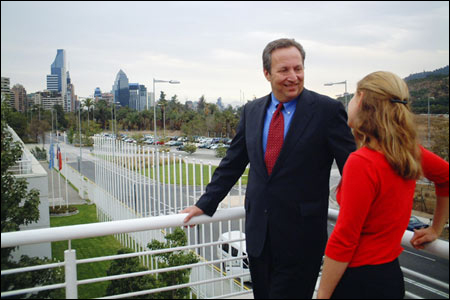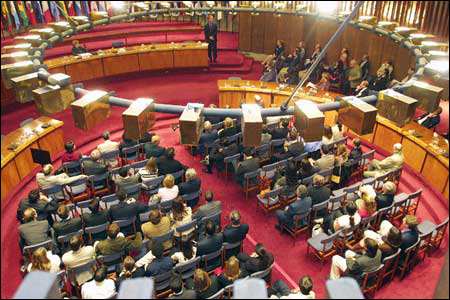Summers visits Chile and Brazil
In first formal Latin American visit by a Harvard president, Summers stresses globalization, international education

President Lawrence H. Summers reaffirmed Harvard’s commitment to globalization and international education on a trip to Chile and Brazil last week (March 30-April 1), the first formal visit to Latin America by a Harvard president. Public lectures and meetings, including one with Chilean President Ricardo Lagos and one with former Brazilian President Fernando Cardoso, packed Summers’ schedule. But his visits with Harvard undergraduates and faculty members affiliated with the David Rockefeller Center for Latin American Studies’ (DRCLAS) regional office in Santiago, as well as with Brazilian students who are part of a formal exchange program between Harvard and two of Brazil’s most distinguished universities, marked high points to his trip.
“The David Rockefeller Center is a remarkable and vibrant institution which is making a great contribution to Harvard University,” Summers said at a public address at the United Nations Economic Commission for Latin America and the Caribbean (ECLAC) in Santiago. “It has provided wonderful support for Harvard faculty who are involved in a myriad of research activities and outreach activities. It has also given our students an opportunity to live and learn outside of the United States using a formula which is new to Harvard.”

Established in 2002, the Rockefeller Center’s regional office in Chile supports faculty research and undergraduate study abroad in southern South America. “This office makes Harvard’s presence in South America more visible and South America’s presence at Harvard more visible,” said DRCLAS Director John Coatsworth, Gutman Professor of Latin American Affairs, at the same gathering.
Summers, who has made international education and enhancing opportunities for Harvard College students to study abroad significant priorities of his administration, called the regional office “probably Harvard’s most significant external presence.” It is the first and only Harvard-run study abroad program.
Latin America’s growth challenge
Summers’ brief trip was packed with opportunities to discuss the University’s current and future impact on the region. In Santiago, in addition to a private meeting with Lagos, he led a discussion with Harvard students at their center and addressed a reception for the Harvard Club of Chile, sponsored by the Harvard Alumni Association.
Additional resources:
Speeches: Remarks at U.N. Economic Commission for Latin America and the Caribbean
Remarks at Harvard Alumni Association reception, Santiago, Chile
In Sao Paulo, Brazil, Summers met with students of the Funcacao Getulio Vargas and Universidad Sao Paulo, collaborators on a student exchange program with Harvard. In a classroom discussion, Summers fielded the Brazilian students’ questions regarding education, economics, and politics.
In his speeches and meetings with policy-makers in Chile and Brazil, Summers underscored Harvard’s commitment to a strong Latin America and an open community of the Americas. He outlined the importance of globalization and the growth challenges facing Latin America.
“Finding a niche is essential for middle-income countries,” he said at his public lecture to 200 academics, business leaders, and economists at ECLAC. “And this is the growth challenge in Latin America in the decade ahead. I cannot help but wonder whether more emphasis must be placed on higher education, as well as primary and secondary education. And the development of research-oriented universities and the rigorous selection and education of the most able students should be a higher priority in the region than in the past.”

Summers discussed the potential of universities like Harvard to meet the region’s challenges through the knowledge, understanding, and research that are at the core of their missions.
“As we educate our young people and we prepare them for the great professions of law, government, medicine, education, and business, we are preparing those who will lead us all. If they develop their common understanding and common commitment to global challenges, they will determine how and how successfully they are met,” he said at ECLAC.
“If it was Harvard’s challenge at the beginning of the 20th century to become a truly national university while remaining true to its New England roots, it is our challenge today to become a global university, rooted in American traditions,” Summers continued. “What we are doing here in Chile and Brazil and in other places in Latin America … is in many ways a template for efforts we are – and we will be – making with much greater intensity around the world.”




